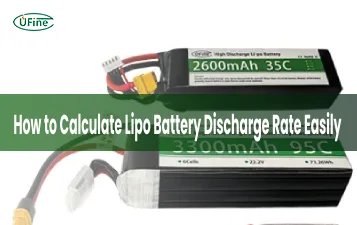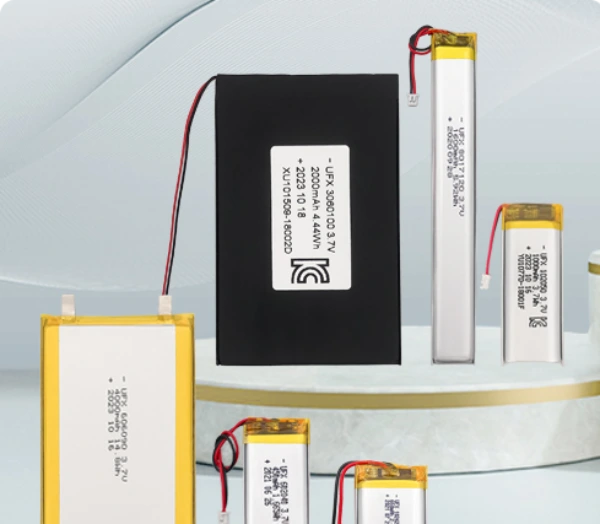Part 1. What is the LiPo battery cell?
LiPo battery cell is also called lithium polymer battery cell. It is also a type of lithium-ion battery. The LiPo battery cell is packaged with aluminum-plastic composite film. It is a battery core composed of a semi-solid polymer with an internal structure.
Compared with liquid lithium batteries, LiPo battery cells have many obvious advantages, such as high energy density, smaller size, ultra-thinness, lightweight, and high safety.
Part 2. LiPo battery cell composition
Generally speaking, LiPo battery cell mainly comprises positive and negative electrode plates/separators/pole tabs/packaging film and electrolytes. Almost every part of it has its different function.
- Positive electrode piece
- Negative pole piece
- Diaphragm
- Extreme ears
- Packaging film
- Electrolyte
Part 3. LiPo battery cell voltage
The LiPo cell voltage typically ranges from 3.7 volts when fully charged to around 3.0 volts when fully discharged. This voltage range is similar to other lithium-based rechargeable batteries, such as lithium-ion (Li-ion) cells.
- Nominal Voltage: The nominal voltage of a LiPo cell is typically 3.7 volts. This is the average voltage of the cell during most of its discharge cycle and is used as a standard reference value.
- Fully Charged Voltage: A LiPo cell reaches around 4.2 volts per cell. It’s crucial not to exceed this voltage during charging to prevent overcharging, which can lead to damage or fire hazards.
- Storage Voltage: For long-term storage, bringing the LiPo cell’s voltage to a storage level, usually around 3.8 to 3.85 volts per cell is recommended. This helps maintain the cell’s health and prolong its lifespan.
- Minimum Safe Voltage (Discharge Cut-off): LiPo cells should not be discharged below a certain voltage to prevent damage or permanent capacity loss. The minimum safe voltage is typically around 3.0 to 3.3 volts per cell, depending on the specific cell chemistry and manufacturer recommendations.
- Float Voltage: In some applications, such as standby power systems or certain types of battery backup, LiPo cells may be maintained at a float voltage slightly lower than their nominal voltage to keep them topped off without overcharging. This float voltage is usually around 3.6 to 3.7 volts per cell.
Part 4. Advantages and disadvantages of LiPo battery cell
Advantages of LiPo battery cell
1. High safety
It cannot be denied that the LiPo battery cell is relatively safer than the 18650 battery cell. Or the danger may not be so destructive. Under normal circumstances, LiPo battery cells are likely to bulge, rupture, and burn and are not as directly destructive as explosions.
2. Larger capacity
Compared with other batteries, the capacity of LiPo battery cells is larger. The gram capacity of a LiPo battery cell can reach 100/115 mAh/g. LiPo battery cell has 10-15% higher capacity than steel-cased lithium batteries of the same size
3. Flexible shape
Because the LiPo battery cell is packaged with aluminum film and has no fixed shape, it can produce flat cells. For example, Ufine Battery can customize LiPo battery cells of different shapes according to the needs of different customers, making full use of space and increasing battery capacity. This LiPo battery cell is very flexible.
4. Fast charging
Compared with other battery types, LiPo battery cell charges much faster. The LiPo battery cell discharge current is also relatively stable.
5. Relatively lightweight
Lipo battery cells can be thin, and some LiPo battery cells can even be less than 1mm thick.
Since it does not need to be protected by a hard shell, the LiPo battery cell is lighter than the 18650 cells of the same volume.
The LiPo battery cell is 40% lighter than a steel-cased lithium battery of the same capacity and 20% lighter than an aluminum-cased lithium battery;
Disadvantages of LiPo battery cell
1. High cost
Compared with other batteries, the cost of LiPo battery cells is almost the highest. Moreover, the cost of the LiPo battery cell is concentrated on the electrolyte. High cost has become a major factor restricting the development of LiPo battery cells.
2. There is no fixed model
Due to the variability of the LiPo battery cell shape, although it is more adaptable to market needs, it also leads to the lack of a unified model of LiPo battery cell. Therefore, most LiPo battery cells must be customized by contacting the manufacturer.
3. Many fakes
Because LiPo battery cell has a good market prospect, but the manufacturing cost is high. Therefore, many flattened 18650 cells on the market serve as LiPo battery cells.
Part 5. Lipo battery cell applications
LiPo (Lithium Polymer) battery cells find application across various industries and devices due to their high energy density, lightweight design, and versatility.
Here are some common applications of LiPo battery cells:
- Consumer Electronics
- Remote-Controlled Vehicles
- Medical Devices
- Portable Power Banks
- Electric Vehicles
- Aerospace and UAVs
- Portable Lighting
- Radio-Controlled Hobbyist Devices
- Industrial and Robotics
- Renewable Energy Storage
Part 6. How to choose the LiPo battery cell manufacturer?
Choosing the right LiPo (Lithium Polymer) battery cell manufacturer is essential to ensure high-quality, reliable, and safe battery solutions for your applications. Here are some key factors to consider when selecting a LiPo battery cell manufacturer:
- Reputation and Experience: Look for manufacturers with a strong reputation and extensive experience in the industry. Research their track record, customer reviews, and industry recognition to assess their credibility and reliability.
- Quality and Compliance: Verify that the manufacturer adheres to stringent quality control standards and complies with industry regulations and certifications, such as UL (Underwriters Laboratories), IEC (International Electrotechnical Commission), RoHS (Restriction of Hazardous Substances), and REACH (Registration, Evaluation, Authorization, and Restriction of Chemicals).
- Technology and Innovation: Assess the manufacturer’s level of technological expertise and commitment to innovation. Look for companies that invest in research and development to improve battery performance, energy density, safety features, and manufacturing processes.
Production Capacity and Capability: Evaluate the manufacturer’s production capacity and capability to meet your specific volume, lead times, and customization options requirements. Ensure they have state-of-the-art manufacturing facilities and scalable production capabilities to support your needs. - Product Range and Specialization: Consider whether the manufacturer offers a comprehensive LiPo battery cell range that aligns with your application requirements. Look for companies that specialize in producing batteries for your specific industry or application, as they may offer deeper expertise and tailored solutions.
- Supply Chain and Sustainability: Assess the manufacturer’s supply chain management practices and commitment to sustainability. Ensure they source high-quality raw materials and components ethically and responsibly and prioritize environmental stewardship throughout production.
- Customer Support and Service: Evaluate the manufacturer’s customer support and service level. Look for companies that provide responsive and knowledgeable technical support and timely assistance with product selection, customization, and after-sales support.
- Cost and Value: Compare pricing and value-added services offered by different manufacturers to ensure you get the best balance of cost-effectiveness and quality. Avoid compromising quality for cost savings, as inferior batteries may lead to performance issues, safety risks, and higher long-term costs.
Part 7. Custom LiPo battery cell manufacturer: Ufine Battery
Ufine Battery, a leading customized lithium battery manufacturer, boasts a stellar reputation and extensive experience in the industry.
Ufine diverse product range includes lithium polymer batteries, lithium-ion batteries, 18650 batteries, and LiFePO4 batteries, showcasing Ufine specialization in tailored battery solutions.
Backed by state-of-the-art manufacturing facilities and scalable production capabilities, Ufine Battery has the capacity to produce customized lithium batteries of various sizes, capacities, and voltages efficiently and reliably.
With a strong focus on quality and compliance, Ufine Battery adheres to stringent standards and regulations to ensure the reliability and safety of Ufine batteries.
Moreover, Ufine dedicated customer support and service team ensures a seamless experience for clients, providing expert guidance, technical assistance, and responsive service. Ufine Battery offers competitive pricing and excellent value, making them a trusted partner for businesses seeking high-quality customized lithium batteries.
Related Tags:
More Articles

LiPo Battery Discharge Rate Guide & Calculation Tips
Understand LiPo battery discharge rates, C-ratings, and how to calculate max current. Essential guide for RC, drones, and electronics users.
High‑Capacity 3S LiPo Batteries: 5000 mAh vs. 10000 mAh
Compare 3S LiPo 5000mAh vs 10000mAh batteries by weight, power, and use. Find the best fit for your drone, RC car, or boat setup.
Top 5 Applications for Small 3S LiPo Batteries
Small 3S LiPo batteries power drones, RC gear, wearables, and robotics with high energy and low weight. Making them ideal for compact electronics projects.
Building and Charging Your Own 3S LiPo Pack: A Step‑by‑Step Guide
Learn how to build, balance, and charge a 3S LiPo battery pack safely at home with this complete DIY guide for hobbyists and beginners.
How to Choose the Right LiPo Battery Plug Type?
Discover the best LiPo battery plug types, how to choose them, and expert tips for safe usage, soldering, and maintenance.





